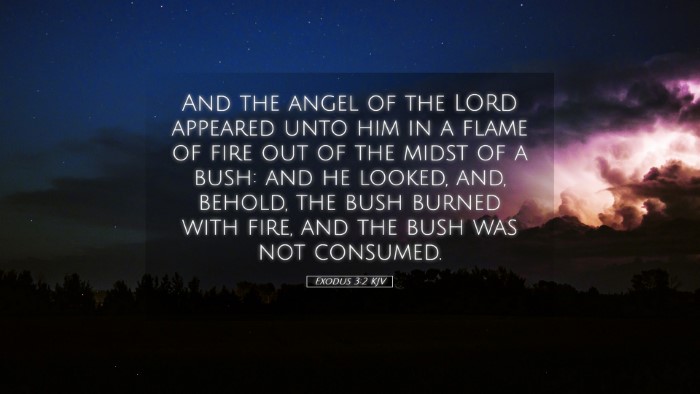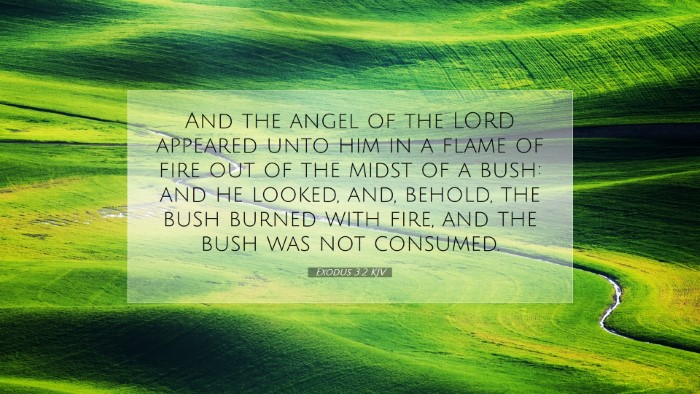Commentary on Exodus 3:2
Exodus 3:2 states: “And the angel of the Lord appeared unto him in a flame of fire out of the midst of a bush: and he looked, and, behold, the bush burned with fire, and the bush was not consumed.” This verse is pivotal in the narrative of Moses and serves as a profound theological and spiritual point of reflection. Below are the insights drawn from various public domain commentaries.
Divine Revelation through the Burning Bush
Matthew Henry interprets this event as a significant moment of divine encounter, suggesting that the "angel of the Lord" represents the pre-incarnate Christ. This theophany reveals God's holiness and His desire to communicate with humanity. The burning bush, a striking image, symbolizes God's presence; it is a reminder that God is both transcendent and immanent, able to take something ordinary and make it extraordinary.
Adam Clarke expands on the notion of the burning bush by pointing out that the bush represents Israel, which, though in the midst of affliction and fire (representing suffering and oppression in Egypt), would not be consumed. This interpretation highlights God's protection over His people, assuring them of His unwavering presence amidst trials and tribulations.
The Symbolism of Fire
Fire is a complex symbol within the Scriptures, representing both judgment and purification. Albert Barnes notes that in this instance, the fire signifies the purity and holiness of God. It serves as a dual reminder; while God is indeed a consuming fire that judges sin, He is also a fire that refines and purifies. The bush not being consumed indicates that God's glory does not destroy His creation but rather sustains and redeems it.
Divine Communication
The burning bush incident establishes a framework for understanding how God communicates with humanity. According to Matthew Henry, God’s method of revelation often comes in unexpected circumstances, urging believers to be vigilant and attentive to His voice. Moses's initial curiosity leads him to explore this divine phenomenon, which emphasizes the necessity of seeking God in the ordinary moments of life.
Moses's Response
Moses's reaction upon noticing the burning bush also carries significant weight. He turned aside to see this great sight (Exodus 3:3), demonstrating an essential principle of spiritual responsiveness. Adam Clarke remarks that Moses’s willingness to approach God’s presence sets the stage for his commission. His curiosity illustrates a heart that yearns for deeper understanding and connection with the Divine.
God’s Assurance and Calling
Following the revelation of His presence, God speaks to Moses. Albert Barnes reflects on God’s assurance to Moses that He sees the suffering of His people, thus revealing an aspect of God’s character—His compassion. This interaction emphasizes the reality that God is intimately aware of the struggles faced by His people and is prompting His servant to take action. God’s calling of Moses represents a transformation from a shepherd to a liberator, marking a significant shift in His purpose and life mission.
Theological Implications
The implications of Exodus 3:2 extend beyond Moses and resonate throughout biblical theology. Matthew Henry posits that this encounter signifies God’s overarching plan of redemption for humanity. Just as the burning bush was not consumed, the promise of life God offers persists through struggles and trials. This passage invites readers to contemplate their own encounters with God—how God meets them in their personal "burning bushes."
Conclusion
In conclusion, Exodus 3:2 serves as a critical junction in the narrative of redemption, reflecting God's character and His plan for His people. The commentary insights reveal layers of meaning regarding divine presence, holiness, divine communication, and the active role of God in the lives of believers. As pastors, students, theologians, and scholars reflect on this verse, they may draw encouragement from the promise that God inhabits the spaces of our struggles and calls us to partner with Him in His plans.
Further Reflection Questions
- What "burning bushes" might God be placing in front of us today, and are we attentive enough to notice?
- How does understanding God as both transcendent and immanent shape our view of suffering and divine presence?
- In what ways is God calling us to action as He called Moses?


